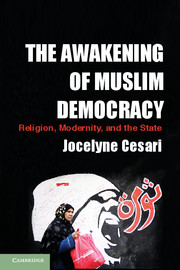Crossref Citations
This Book has been
cited by the following publications. This list is generated based on data provided by Crossref.
el-Aswad, el-Sayed
2016.
The State of Social Progress of Islamic Societies.
p.
361.
Fox, Jonathan
2016.
Handbook of Religion and Society.
p.
445.
Diallo, El Hadji Samba
and
Kelly, Catherine Lena
2016.
SufiTuruqand the politics of democratization in Senegal.
Journal of Religious and Political Practice,
Vol. 2,
Issue. 2,
p.
193.
Buckley, David T.
2016.
Religious actors and constitution drafting: the Philippines and the Arab awakening in comparative perspective.
Journal of Religious and Political Practice,
Vol. 2,
Issue. 2,
p.
212.
Fox, Jonathan
2016.
Secular–religious competition in Western democracies: 1990 to 2014.
Journal of Religious and Political Practice,
Vol. 2,
Issue. 2,
p.
155.
Anderson, John
2016.
Religion, state and ‘sovereign democracy’ in Putin’s Russia.
Journal of Religious and Political Practice,
Vol. 2,
Issue. 2,
p.
249.
Arfaoui, Khedija
and
Moghadam, Valentine M
2016.
Violence against women and Tunisian feminism: Advocacy, policy, and politics in an Arab context.
Current Sociology,
Vol. 64,
Issue. 4,
p.
637.
Driessen, Michael D.
2016.
The Wiley Blackwell Companion to Religion and Politics in the U.S..
p.
500.
Cesari, Jocelyne
and
Fox, Jonathan
2016.
Institutional Relations Rather Than Clashes of Civilizations: When and How Is Religion Compatible with Democracy?.
International Political Sociology,
Vol. 10,
Issue. 3,
p.
241.
Tepe, Sultan
2016.
Contesting political theologies of Islam and democracy in Turkey.
Journal of Religious and Political Practice,
Vol. 2,
Issue. 2,
p.
175.
Cesari, Jocelyne
2016.
Disciplining religion: the role of the state and its consequences on democracy.
Journal of Religious and Political Practice,
Vol. 2,
Issue. 2,
p.
135.
Nazar, Mudasir
2016.
Islamic political parties and the nature of politics in Pakistan.
Asian Journal of Political Science,
Vol. 24,
Issue. 2,
p.
237.
Mednicoff, David
2017.
Constitution Writing, Religion and Democracy.
p.
317.
Fox, Jonathan
2017.
Religious discrimination in European and Western Christian-majority democracies.
Zeitschrift für Religion, Gesellschaft und Politik,
Vol. 1,
Issue. 2,
p.
185.
Fair, C. Christine
and
Chen, Junjie
2017.
Polity or Policy? Explaining Ordinary Muslimss Support for Suicide Bombing.
SSRN Electronic Journal ,
Ahmed, Zahid Shahab
2017.
National Identity Formation in Pakistan: Analysis of the Anti-Secular Narrative.
Journal of Citizenship and Globalisation Studies,
Vol. 1,
Issue. 1,
p.
63.
Jelen, Ted G.
2017.
Religion and Self-Governance: Catholicism, Islam, and the Issue of Censorship.
Politics and Religion,
Vol. 10,
Issue. 3,
p.
567.
Drevon, Jerome
2017.
The Constrained Institutionalization of Diverging Islamist Strategies: The Jihadis, the Muslim Brotherhood, and the Salafis between Two Aborted Egyptian Revolutions.
Mediterranean Politics,
Vol. 22,
Issue. 1,
p.
16.
Saiya, Nilay
2018.
Weapon of Peace.
Kranendonk, Maria
2018.
The relationship between social identification and local voting, and its interplay with personal and group discrimination among the descendants of Turkish immigrants in Western Europe.
Comparative Migration Studies,
Vol. 6,
Issue. 1,





